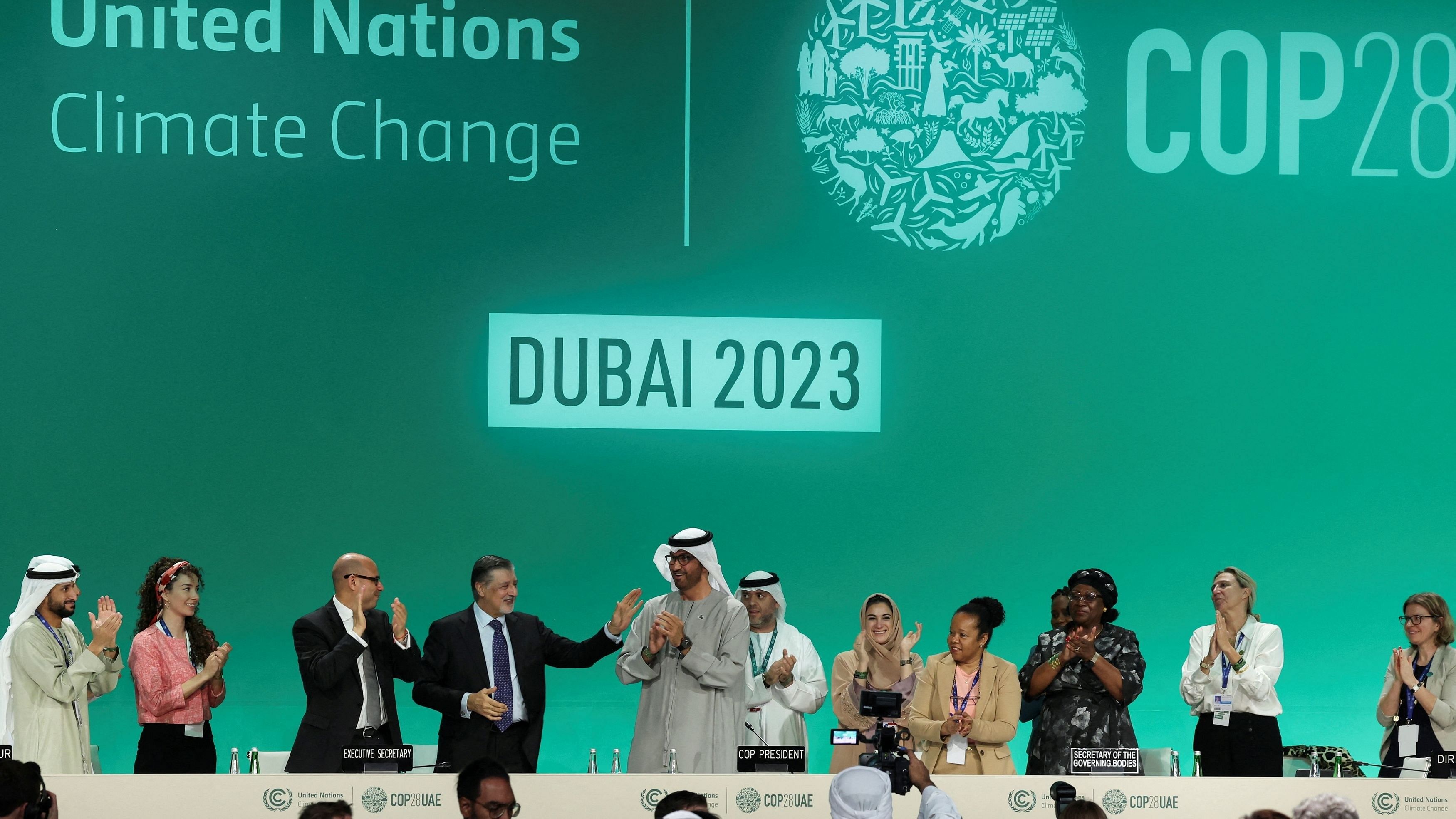
Dignitaries at the United Nations Climate Change Conference COP28 in Dubai, UAE.
Credit: Reuters photo
Climate change is no longer an academic rhetoric or political jargon—it has become a global reality manifesting in natural calamities. Climate change-induced losses serve as lessons, urging us to restore the ecological balance that humans have disrupted before it is too late. The dangers looming over our future are underscored by the recent discussions around climate tipping points. In response, significant climate action initiatives, such as the Brundtland Conference, Montreal Protocol, Kyoto Protocol, and Paris Agreement, have led to the development of various strategies to combat climate change.
With this reiterated urgency of addressing climate change through knowledge-driven solutions, the upcoming United Nations Climate Change Conference (COP29) in November 2024 brings great expectations. It builds on the goals set during the COP28 in 2023, held in Dubai, United Arab Emirates, where key discussions focused on the sinking of Pacific islands, the global renewables and energy efficiency pledge, climate and health, the first global stocktake, and the establishment of a global loss and damage fund to support the most vulnerable nations. COP 28 kindled the idea that timely actions can still prevent irreversible damage.
Now, COP29, scheduled in Baku, Azerbaijan, aims to build on these commitments and chart a future course. The sessions, running from November 11 over 12 days, will focus on several key discussions:
(1) the World Leaders Climate Action Summit, a leading forum for public-private partnership, facilitating exchange in technology and innovation in multiple sectors such as energy, transport, finance, and industry.
(2) Roundtable discussions on developing holistic and balanced non-market approaches mentioned in Article 6 of the Paris Agreement that include mitigation, adaptation, finance, technology transfer, and capacity-building.
(3) High-level ministerial dialogue on climate finance.
(4) Local Communities and Indigenous Peoples Platform (LCIPP) annual gathering to incorporate traditional knowledge of indigenous knowledge holders on local climate systems.
(5) Youth-led climate forum dialogue, and others. The summit also aims to give voice to the UNFCCC constituencies by allowing them to nominate two representatives to the Friends of the COP29 Presidency forum who will have a direct say when needs and priorities are discussed. This ensures that the climate negotiations are just, transparent, and inclusive.
The developments in the upcoming COP29 would pave the way for building a future roadmap for investment in climate action. As precursors of the COP29 Summit, a high-level dialogue on climate transparency was held in September 2024 in Baku to strengthen global cooperation and help member countries develop biennial transparency reports that will be presented at COP29. On the same lines, the Baku Climate Global Transparency Platform has been launched in the presence of the COP Troika (UAE, Azerbaijan, Brazil) to reiterate that climate transparency is crucial. Particular emphasis has been given to global collaboration in the fight against climate change.
India is emerging as a global leader in climate action. Our global carbon emissions, which are lower than 4%, are evidence of the balance that we have struck between collaborative usage of renewable and non-renewable energy sources via the mix-energy strategies, even though we account for 17% of the world’s population. India has set up an aspiring goal to become carbon neutral by 2070. The Global Green Credit Initiative, co-hosted by PM Modi with the UAE at the COP28, was one such step towards becoming the driver for change and a beacon to developing countries. India has also proposed to host the COP33 in 2028.
UNFCCC COP is a forum that must uphold the concept of Common but Differentiated Responsibilities and Respective Capabilities (CBDR-RC). Climate change is all countries’ shared responsibility according to their contributions and potential. If a nation is responsible for causing climate change in history, the responsibility for climate actions must also lie with that nation. This is also enshrined in the ‘Polluter Pays Principle’ that sets a liability on developed countries to be the manoeuvres of change towards a sustainable future. Thus, COP29 will be expected spearhead future climate policies and actions against climate change. The climate transparency reports expected to be tabled at the COP forum will facilitate framing of international climate laws.
(Anand Madhukar is Assistant Professor and Programme Coordinator (Climate Science & Policy), and Vasudha Barthwal is a postgraduate student at TERI School of Advanced Studies, New Delhi)